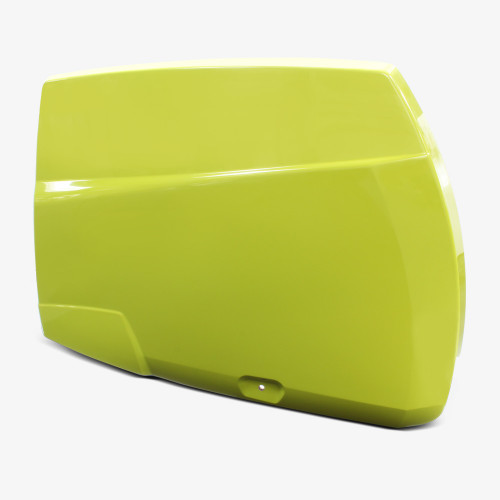
Component for the agricultural industry, manufactured using the resin injection process (resin transfer molding)
In the area of RTM (Resin Transfer Molding), we specialize in the VA-RTM process, a manufacturing method in which resins and glass fiber are processed in the form of mats into components made of glass fiber reinforced plastic (GRP) by means of an injection process supported by vacuum.
In this method of manufacturing, special glass fiber mats are impregnated with synthetic resins in a mold. It is a closed process in two-part molds made of plastic. These are manufactured in our in-house mold shop according to the C.F. Maier standard. This enables us to guarantee a high level of process reliability.
As a rule, in the RTM process, a surface gelcoat is first applied to one side of the mold and then the fiber reinforcement is inserted if necessary with a rigid foam core. If required, local metal or wood inserts, cables and empty tubes are added to sandwich parts. Before the mold is closed and locked – a separate clamping machine is not required – the resin is fed in, from which microcellular structural rigid foam is produced with vacuum assistance. It encases the fiber reinforcement together with the inserts. The vacuum ensures that the foam resin is completely and evenly distributed inside the mold.
The result is smooth components with a high surface quality on both sides, which are finished by machining on CNC equipment. The use of gelcoat means that further painting is not absolutely necessary. The part surfaces and contours are tool-defined. The process produces components with low weight and high load-bearing capacity at the same time.
A particular advantage of the process is the possibility of producing very large-area parts. The largest size we have produced so far is 11.8 x 7.5 feet. This does not have to involve only flat parts. Heavily deformed vehicle fronts for motor homes show that there are virtually no limits to design wishes.
Sandwich parts receive either rigid foam cores made from sheet material or molded foam inserts, which we produce in-house and which may well have local wall thickness differences. Other filler materials are also used. Sandwich construction improves the stiffness, thermal and sound insulation of the finished plastic part.
The possibility of integrating all conceivable inserts into sandwich parts allows enormous savings to be made on assembly costs. For example, in the case of a motorhome rear wall, the wiring for the taillights and license plate lighting can already be integrated, while the inner surface is prepared for the installation of wall cabinets, lighting fixtures, etc., or otherwise serves as a functional surface.
We process only polyester resin in the RTM process.
Tooling costs are low in the case of plastic tools. Even annual requirements of a few hundred parts can therefore be produced economically. On the other hand, annual productions of more than 10,000 parts are possible with multiple metal tools in clocked production.
The VA-RTM process is similar to the vacuum expansion process. However, the resin is pumped in and foaming is not required. We will be happy to advise you on the selection of the right manufacturing process for your requirements.